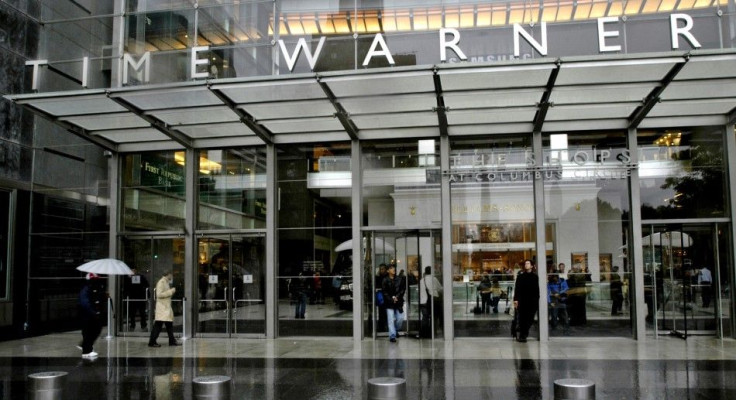Time Warner Inc (TWX) Earnings Preview: Higher Q1 2013 Profits In Advance Of Publishing Spinoff

Time Warner Inc. (NYSE:TWX) is expected to report higher first-quarter earnings on marginally increased revenue Wednesday as a weak box office for Warner Bros. Entertainment dragged down strong advertising revenues and affiliate fees for its Turner Broadcasting unit.
The New York-based media company, which reports on Wednesday at 10:30 a.m. EDT, is expected to show net income of $707 million, or 74 cents per share, up from $661 million, or 67 cents a share, for the same period last year. Analysts polled by Thomson Reuters expect Time Warner to report revenue of $7.12 billion, up 2.1 percent from last year’s $6.98 billion for the three-month period that ended March 31.
The biggest news from Time Warner for Q1 2013 came on March 6, when the company announced that it plans to spin off Time Inc., its publishing unit, into a separately traded public company. The move mirrors a similar spin-off underway at Rupert Murdoch’s News Corp. (NASDAQ:NWSA), and it speaks volumes about the ongoing struggles of print media. Time Inc., whose stable of properties includes Sports Illustrated, People and its flagship Time magazine, is the world’s largest magazine publisher.
Michael Corty, an analyst with Morningstar, said in a March research note that the spin-off news did not come as a surprise given Time Warner’s reported talks with Meredith Corp. (NYSE:MDP) over the last few months, during which Meredith was rumored to be eying a purchase of some of Time Inc.’s titles. The spin-off also falls in line with Time Warner’s less-is-more strategy, which it has followed since its disastrous merger with AOL (NYSE:AOL) in 2000 -- a deal that now serves as a cautionary tale on the potential pitfalls of massive media mergers. Since that time, Time Warner has become decidedly more nimble, spinning off both AOL and Time Warner Cable (NYSE:TWX), and selling the Time Warner Book Group to the French publisher Hachette Livre.
Either way, Corty believes that the latest spin-off will not have a significant bearing on Time Warner’s overall value. Morningstar estimates that the slow-growth Time Inc. comprises less than 10 percent of the company’s operating income, and that in assessing Time Warner stock, analysts spend most of their time gauging its television, cable networks and filmed entertainment units.
“Clearly there are headwinds for the magazine industry as the world shifts from print to digital distribution, and Time Warner had done a solid job in reducing costs to maintain profitability,” Corty wrote. “We assume this philosophy would stay the same once Time Inc. becomes a separate public company.”
Tim Nollen and James Kopelman, two analysts with Macquarie, agree. Citing ad-revenue growth and the potential for re-rating Time Warner after the spin-off, the two rated Time Warner stock as Outperform, calling it their “top pick” among the big media companies.
The rating comes despite a weak quarterly box office for Warner Bros. Pictures. All five of Warner’s major film releases underperformed domestically, in particular Richard LaGravenese’s “Beautiful Creatures” and Bryan Singer’s “Jack the Giant Slayer.” “Creatures” took in less than $20 million on a $60 million budget, while “Slayer” earned just $63 million on a $195 million budget.
In contrast, Time Warner’s cable networks unit, which generates about 70 percent of the company’s cash flow, continues to perform well, with strong ad sales and affiliate fees accounting for the growth. Macquarie estimates that the unit will show a 4.5 percent boost in revenue for the quarter. Despite increased competition from video-streaming services such as Netflix (NASDAQ:NFLX), Time Warner’s Turner Broadcasting System carries some of the most widely distributed channels in the industry, with a portfolio that includes HBO, CNN, TNT, TBS and others.
Corty, who said Time Warner’s stock is “underappreciated” in the market, also said the networks’ continued market dominance boils down to their ability to produce superior content (top-rated original programing on HBO, for instance), which will help Time Warner maintain an edge, even in the face of new competition.
“Television content creation and distribution is not a winner-take-all market,” he wrote. “Deep-pocketed companies such as Apple (NASDAQ:AAPL) and Google (NASDAQ:GOOG) are often cited as significant threats to content-generating firms. It can't be ruled out, but building from scratch would be much more challenging than it may seem.”
Time Warner shares closed Monday at $60.13, up 77 percent.
Got a news tip? Send me an email. Follow me on Twitter: @christopherzara
© Copyright IBTimes 2024. All rights reserved.












